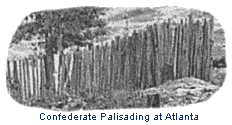  An obstacle composed
of palisades. A palisading was constructed by digging a trench about three
feet deep along the line that the obstacle was to cover. Palisades were then
placed in the trench in a vertical position or inclined toward the front
either individually, between 6 and 10 inches apart, or in pre-fabricated
panels or sections. A riband was then laid on the palisades and spiked down
to ensure the connect between palisades and prevent an enemy from being able
to pass the obstacle by knocking down one or two palisades. The trench was
then filled and tamped. A second riband could be added along the interior
side of the palisades about six feet above ground level to reinforce the
connection between individual palisades. An obstacle composed
of palisades. A palisading was constructed by digging a trench about three
feet deep along the line that the obstacle was to cover. Palisades were then
placed in the trench in a vertical position or inclined toward the front
either individually, between 6 and 10 inches apart, or in pre-fabricated
panels or sections. A riband was then laid on the palisades and spiked down
to ensure the connect between palisades and prevent an enemy from being able
to pass the obstacle by knocking down one or two palisades. The trench was
then filled and tamped. A second riband could be added along the interior
side of the palisades about six feet above ground level to reinforce the
connection between individual palisades.
 Palisadings
were generally employed in positions that were covered from enemy artillery
fire, particularly in ditches and along the interior slopes of covered ways,
though they were occasionally used on the glacis or just in front of the
crest of the counterscarp of field fortifications. Openings between the palisades
were intended to allow the defenders' musket fire to pass through the obstacle
and prevent an attacking body of troops from using the palisading as cover. Palisadings
were generally employed in positions that were covered from enemy artillery
fire, particularly in ditches and along the interior slopes of covered ways,
though they were occasionally used on the glacis or just in front of the
crest of the counterscarp of field fortifications. Openings between the palisades
were intended to allow the defenders' musket fire to pass through the obstacle
and prevent an attacking body of troops from using the palisading as cover.
|